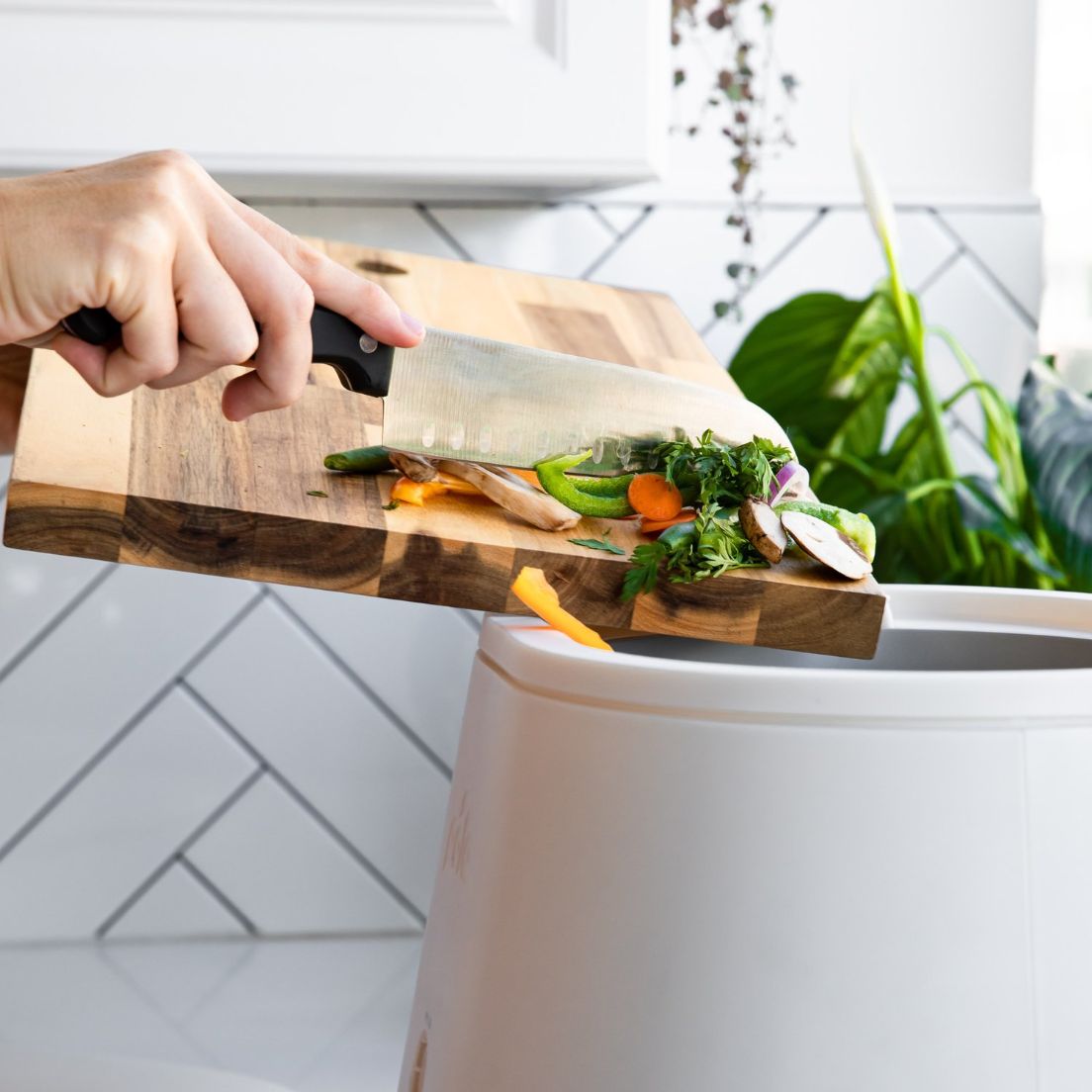
Composting has been a home recycling concept for as long as humans have been somewhat intelligent. Early civilizations knew the importance of the organic matter and good soil for crops and soon made the connection between crop success and nutrient-rich soil. So, early on mankind began composting, even if they did not really understand fully what they were doing.
If you are interesting in learning what is compostable and what isn't, you can check out our guide on what to compost here. The article has a list of 100+ common household items that you are probably unsure about!
Over time, we have learned more and become much more efficient at composting organic matter and converting it to useable soil, and Lomi is the next step in that evolution. With the advanced quick compositing system from Lomi, you can compost eggs, although you have to use the correct method and keep some key points in mind as you do. Let’s take a look at those now.
Tips For Using Lomi to Compost Eggs and Eggshells

Many household items can be composted including eggs, but you need to be sure you are composting them correctly in order to get the best possible results. There are some quick facts to consider regarding the questions of are eggshells compostable, can you put raw eggs in compost, and can you compost whole eggs once cooked:
Eggshells

Are egg shells compostable? Yes, but they are by far the most durable part of the egg and therefore the most difficult to fully compost. While it is not necessarily required to crush eggshells before composting them, doing so will speed up the composting process. With a normal compost bin, eggshells can take up to a month to fully break down. With Lomi, they will compost down as quickly as any of the verified safe to add materials. You can definitely add your eggshells to Lomi and use them along with other organic food scraps to make rich soil for your plants.
Raw eggs

Most things that are biodegradable can be composted since compositing is simply the sped-up version of natural breakdown in organic elements. The main argument against composting raw eggs is the concerns about pest control and the smell. With Lomi, neither of these are going to be an issue because the composting takes place in a matter of hours rather than days or weeks. While decomposing raw eggs with a traditional compost bin set up, the process will release foul-smelling odors. Thankfully, these are avoided completely with Lomi compositing bins.
Cooked eggs

These are the safest and easiest forms of egg that you can add to your Lomi composting bin. You can compost cooked eggs since pretty much anything that can be eaten can be turned into compost. And cooked eggs and egg scraps are on the Lomi-approved compositing list, so you are good too of there as well. The only thing to keep in mind is that some prepared eggs have other ingredients in them- butter, salt, cheese, etc.- so as long as nothing overly bizarre has been added o your eggs while they were being eaten, they are safe to add to your Lomi composter.
With the basics out of the way, let’s dive a little deeper into how Lomi can make composting egg scraps faster and easier than ever before!
Can You Compost Scrambled Eggs?

Pros
Scrambled eggs are a quick and easy addition to toss into your Lomi anytime there are scraps and leftovers after a hearty breakfast. Scrape your breakfast plates into the Lomi bin and let it work its magic on your scrambled eggs and other cooked egg scrap pieces.
Cons
Be mindful if you are adding a lot of salt and pepper to your eggs as that could affect the PH of your soil but in small amounts, there should be no issues. Keep this in mind, so you can get the best results from your Lomi composting endeavors, and be sure to add other organic matter in at the same time.
Can You Compost Cooked Eggs With Lomi?

Pros
All manner of cooked eggs can be added to your Lomi composter for a quick and easy way to reuse table scraps and make breakfast clean up a snap. There is no prep work needed, just scrape the plates into the bin and let Lomi go to work making it into convenient compost.
Cons
You will get better results with composting cooked eggs if you use Lomi on the longer composting cycle. This ensures everything can break down properly. This is especially important if you have added dairy such as milk or cheese to your eggs, so it can be completely composted down.
Can You Compost Hard Boiled Eggs?

Pros
Hard-boiled eggs can also be added to your countertop composter without any major concerns or prep work needed. The composter will break it down just like any other egg component that you may already be adding to your Lomi composting bin.
Cons
If you have a whole boiled egg to compost, you will get better results by breaking it up and scattering it through the compost pile rather than setting it in whole. This is especially true of the yolk which can take a little longer to compost when hard-boiled.
Can You Compost Egg Yolks in Your Lomi?

Pros
Some recipes call for only egg whites to be used, and if you don’t have something else to use the yolks for, you may need to just throw them out. Thankfully, egg yolk is also approved for use with the Lomi counter composting bin, so you can at least use them for compost.
Cons
You will, however, need to limit how many yolks you add to your composting pile as there needs to be a good mix of other green and brown organic materials. This will help the yolk be absorbed and broken down more quickly and completely during the composting process.
Benefits of Eggs and Eggshells in Compost

Eggs are a soft product that can easily be composted and broken down, save for the shells while can take a little longer in a normal composting pile. They add a lot of nutrients to the composted soil and can also yield great composting material. Adding egg scraps to your Lomi will make it easier to clean up after meals and reduce the amount of food waste ending up in the landfill.
Another added benefit of the Lomi system is it is much faster and more sanitary than a traditional composting bin or tumbler system. Composting cooked eggs in a normal compost bin can lead to an anaerobic reaction. These bacteria will interfere with the composting process and are the primary cause of rotting smells, mold growth, and other issues with composting. The Lomi system has been specifically designed to prevent these issues from occurring, even when adding eggs and eggshells. This unique composting system can quickly and effectively break down these high-protein foods without the concern over negative side effects.

How Long Does It Take for Eggs to Compost With Lomi?

Normal composting processes are not really known for being a fast, easy process. For most of the time that humans have been composting, it simply involved tossing organic matter into piles and letting it break down and decompose naturally. And in time we learned the process could be sped up a little by turning and mixing it from time to time. Even so, it could still take months to get anything useable as far as soil goes. Nobody has time for that today!
Fortunately, there’s a solution. Advancements have been made, and there are smaller home and yard composting bin spinners that can churn out some nutrient-rich soil in a matter of weeks. But we can do even better than that. This is where Lomi goes and what the passion behind this innovative concept is. This compact countertop composter can now take your organic food waste and squish it into the food that plants crave in less than a day! In some cases, it can work even faster than that, and food scraps can be composted down in as little as eight hours!
There are three basic settings on the Lomi.
- Eco Express cycle takes 3-5 hours. This is the perfect way for homeowners to jumpstart a bigger composting pile as it will start eh decomposing process, so the final results are seen sooner when added to an ongoing compositing pile or bin.
- The Grow cycle takes 16-20 hours. When this baseline composting cycle finishes, you’ll have microbially-rich compost that is ready to use. You can add it to your gardens or use in your potted household plants to keep things looking and growing beautifully.
- Lomi Approved Bioplastic cycle takes 5-8 hours. This is the most unique feature of Lomi’s special composting cycle and is its major selling point. Unlike other composters, Lomi can break down certified organic plastics to be added to the soil.
It is important to take note that overall processing time may vary. Not everything composts equally. Some materials will break down sooner and easier than others, even when using Lomi. This is simply due to the size, density, and composition of the materials being composted, as well as the external conditions including temperature and humidity. Leaf litter and grass clippings can be broken down easily in a matter of hours, while a full orange, peel and all, can take eight hours or more to fully break down. This is normal and is where a good understanding of composting with Lomi can make a difference in how easily the system is for you to use!

Final Thought About Composting Eggs With Lomi
Can you compost eggs? Yes, as long as you know these basic guidelines, and you are able to adapt and learn as you go, you’re set to have success with the Lomi system. With normal household organic waste, you can create rich compost in fewer than two days with Lomi! Now is the perfect time to jump on the eco-friendly bandwagon and get started for yourself. With this innovative counter composting system for the home, you can do your part to make a positive impact on the environment, reduce waste, and lower your carbon footprint. Contact the team today to get started and to make a difference with Lomi!
